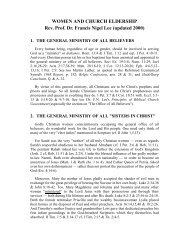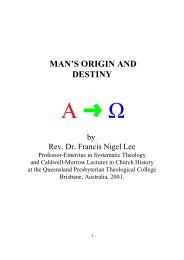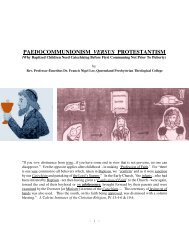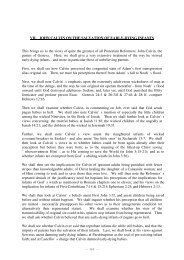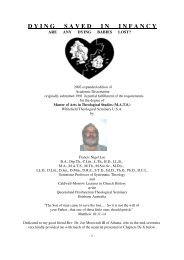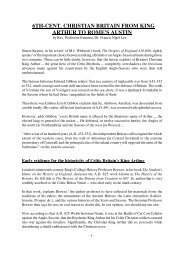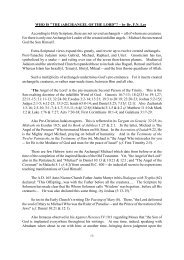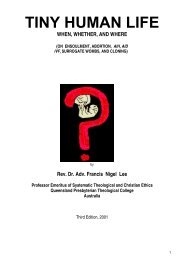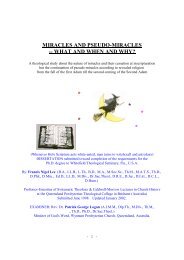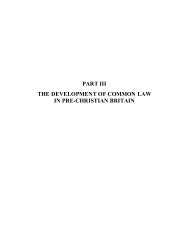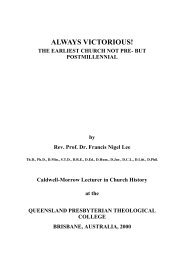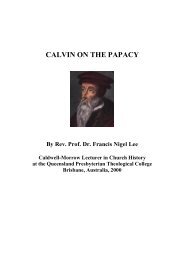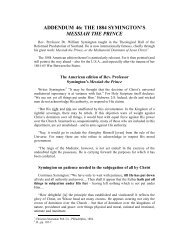good the flow <strong>of</strong> history through time."If we do not fulfil our vocation today, we in South Africa run the same risk <strong>of</strong> ending up wherethe European churches have ended up -- churches with a tremendous past, but churches with n<strong>of</strong>uture. <strong>The</strong> new times in which we live ask <strong>of</strong> the Church new forms and new answers. That is onlypossible if we are redeemed from our neuroses and anxieties, and if we fearlessly move forward inthe grip <strong>of</strong> the love <strong>of</strong> Christ."Says Heyns: "<strong>The</strong> kingdom <strong>of</strong> God is thus not <strong>of</strong> the world. But it is indeed in the world. Actually,the world is under God's dominion. And signs <strong>of</strong> this already-present but still-future kingdom, arebeing erected everywhere men bow before the authority <strong>of</strong> God and His Word and where powersare being subdued by God's dominion. <strong>The</strong> appealing order <strong>of</strong> the kingdom means this world isconcerned not only with man, but with men who obey God with the realisation <strong>of</strong> His plan and Hisgoal which He has set for all things -- and within that, with us, our happiness, our service, ourfuture. It thus concerns infinitely more than just the salvation <strong>of</strong> man's soul -- even more than justthe salvation <strong>of</strong> the whole man. It concerns the fulfilment <strong>of</strong> a destiny shared by the entire cosmos-- namely, the honour and majesty and glory <strong>of</strong> God. Thus, obedience to the Ten Commandmentsbecomes one <strong>of</strong> the scores <strong>of</strong> signs <strong>of</strong> the tentatively present kingdom <strong>of</strong> God erected by men --when by their faith in the atoning merit <strong>of</strong> Christ, they launch out above all things and lay hold <strong>of</strong>God's original plan and ultimate destiny for man."I must now pass on, briefly, to mention at least the name <strong>of</strong> H.J. Strauss -- the Pr<strong>of</strong>essor <strong>of</strong> PoliticalScience at the Orange Free State University. He has written many fine brochures -- such as those onHistory and Civilisation and Political Development and the Limited Franchise.And I must especially refer to his "multi-genius" son, Danie Strauss. Danie Strauss is the Pr<strong>of</strong>essor<strong>of</strong> Philosophy at the Orange Free State University who replaced my doctoral promoter Pr<strong>of</strong>essorKock after he suddenly died. Danie Strauss, a young man, is I believe just about the most brilliantman I have ever met. He seems to know a good deal about almost everything. For he seems to be anauthority on mathematics and all <strong>of</strong> the schools <strong>of</strong> mathematics; aesthetics and all <strong>of</strong> the schools <strong>of</strong>aesthetics; and linguistics and all <strong>of</strong> the schools <strong>of</strong> linguistics. He has knowledge <strong>of</strong> languages. Hehas studied Greek and Hebrew, as an amateur, in a way that would put many Preachers to shame.His book on the relationship between philosophy and the special sciences is one <strong>of</strong> the mosttremendous and complicated books that I have ever read.After that big get-together at Potchefstroom University in 1975 I referred to earlier, when ChristianCalvinistic academicians at university level from nineteen countries met at the world's firstInternational Conference <strong>of</strong> Calvinistic Academicians, some <strong>of</strong> the American delegates (particularlythose from Calvin College) went back and said some extremely critical things about South Africaand her race policy. One <strong>of</strong> them, Woltersdorf, who subsequently became the President <strong>of</strong> CalvinCollege, went so far as to say quite rightly that now the Free University <strong>of</strong> Amsterdam was sinking,in his opinion, the future torchbearer <strong>of</strong> international Calvinism would (because <strong>of</strong> racism) not beSouth Africa but the United States and specifically Calvin College.At this point, Danie Strauss took up the cudgel. He pointed out that South Africa has far moreCalvinistic academies than the United States has right now. Woltersdorf was wrong to say thatSouth Africa's race policies disqualify her from playing the role as a viable leader <strong>of</strong> worldCalvinism. Strauss humbly said that South Africa knows her place in the world; knows that she canonly make a partial contribution to the world development <strong>of</strong> Calvinism. Yet her contributionwould hardly be inferior to that <strong>of</strong> the United States in general and Calvin College in particular asregards things Calvinistic. For in Strauss's opinion, the United States in general and Calvin Collegein particular were riddled with a much more deadly heresy than racial discrimination. <strong>The</strong>y were,
he declared, riddled with the ungodly philosophy <strong>of</strong> pragmatism. That should disqualify CalvinCollege, in the opinion <strong>of</strong> any Calvinist anywhere in the world, from picking up the torch andcarrying it further!Strauss has written many books. He also wrote a critique <strong>of</strong> Dr. D.J. Malan's doctoral dissertationon A Critical Study <strong>of</strong> the Philosophy <strong>of</strong> Stoker from the Point <strong>of</strong> View <strong>of</strong> Dooyeweerd. And Straussseems to agree with Van Til in his appreciation <strong>of</strong> this doctoral dissertation.Says Strauss: "He who wishes to bypass the human selfhood in his faithful acceptance <strong>of</strong> revelationis engaged in putting an end to man's subjective (but not his subjectivistic) faith. Only the completeself-surrender <strong>of</strong> man to the central Scriptural basic motive, effects a radical conversion in the root<strong>of</strong> our existence by Christ's directedness towards the heart. It is not revelation which engages inphilosophy, but it is man, and from his full selfhood under the control <strong>of</strong> some or other religiousbasic motive."Christian philosophy and the special sciences would only be grounded in subjective religion if it orthey exalted the full selfhood <strong>of</strong> man (whence all acts <strong>of</strong> thought arise) to the Archimedes' point <strong>of</strong>philosophy. So therefore Dooyeweerd writes, 'the Archimedes' point <strong>of</strong> philosophy is chosen in thenew root <strong>of</strong> mankind in Christ -- in which, by regeneration, we participate in our reborn selfhood."Here, Strauss is siding with the Van Til <strong>of</strong> 1940 against Potgieter. But at this particular point, andwith much respect, I myself side with Potgieter and with the Van Til <strong>of</strong> 1980 -- against Strauss andagainst the Van Til <strong>of</strong> 1940.Another very famous figure in modern South Africa, is Pr<strong>of</strong>essor Adrio König, Pr<strong>of</strong>essor <strong>of</strong>Systematic <strong>The</strong>ology at the University <strong>of</strong> South Africa. UNISA you probably know, is the biggestcorrespondence university in the whole world. Now Adrio Koenig has written a number <strong>of</strong> goodbooks: I Am That I Am; and Here Am I; and also a very powerful eschatological book called OneWho Is Stronger. <strong>The</strong> latter is a vindication <strong>of</strong> the strength <strong>of</strong> Christ in this world, here and now,over Satan and the demons.Writes König: "When Paul in Colossians 2:15 uses the word 'triumphing' for Christ, it means thatChrist has conquered and bound the evil powers and is now marching victoriously throughout theworld. <strong>The</strong> only other time Paul uses this word triumphing (in Second Corinthians 2:14) is in theexpression, 'Christ causeth us to triumph.' <strong>The</strong>re too it means that the worldwide mission is Christ'sgreat triumphal procession throughout the world -- to give everyone everywhere the opportunity tosee that Christ has conquered the enemy so that they too can begin rejoicing and celebrating thevictory together."That is the deepest meaning <strong>of</strong> the Church's missions. This is the meaning <strong>of</strong> Paul's declaration inSecond Corinthians 2:14 -- 'Christ always causes us to triumph' (or, translated a little more clearly,'Christ always causes ourselves to participate in His own triumphal procession'). <strong>The</strong> devil and hishordes have been demoted. Humiliated, all they can do is to run along like little dogs -- behind themissionaries, in Christ's worldwide victory march!"König also tells us that another connection should be indicated -- the connection betweenRevelation twenty and John 12:31. "Now here too," he says, "there is first <strong>of</strong> all an agreement in thewords. Derivatives from the same Greek word are used. John 12:31 declares that the devil is castout; and in Revelation 20:3 it is declared that he is cast into. This similarity <strong>of</strong> the word 'cast,' inboth places, however, goes much further -- especially if one compares the context in which the twopassages occur."



